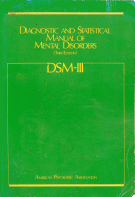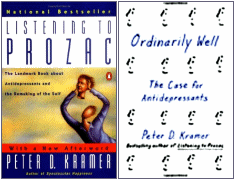-
For as much as we can learn in medicine from the study of syndromatic groups, my own natural inclination is towards in depth case studies. I lament that our journals rarely, if ever, publish them anymore. Of course, the best of both worlds is when we get both. I noticed when we gained access to the data from Paxil Study 329, even though what we had were various forms, I found myself looking at the marginalia and written comments, trying to see the individual behind the form. Point being that all data doesn’t come in graphs and tables. Sometimes it’s whole people, with stories. That’s hardly a surprising comment from a guy who left a hard science career to practice as a psychotherapist.
-
 In my last post I was, once again, going on about what I see as a fundamental flaw in the DSM-III carried forward to today. My persistence in stressing the categorical distinction between Melancholic Depression and depression as a symptom was originally born from my own clinical experience but has come to have other determinants. I suspect that the "lumping" of all depression into Major Depressive Disorder [MDD] was originally a move to get the analysts out of the picture [eliminating depressive neurosis] and a concession to the insurers who have no interest in paying for symptoms arising from "life." But it had pervasive and ominous consequence. The emerging Academic·Industrial alliance co-opted the research being done on Melancholic Depression that was beginning to edge towards a neuro·biologic causality [a promising bio·marker, sleep abnormalities, response to biological treatment, the genetic component, etc] and teleported those findings to all depression [chemical imbalance, Clinical Neuroscience, etc]. It helped sell a lot of unnecessary drugs hurting some in the process, basically shut down a lot of research along productive lines, and wasted untold research dollars chasing neuro-whatever pipe dreams with the wrongest of cohorts.
In my last post I was, once again, going on about what I see as a fundamental flaw in the DSM-III carried forward to today. My persistence in stressing the categorical distinction between Melancholic Depression and depression as a symptom was originally born from my own clinical experience but has come to have other determinants. I suspect that the "lumping" of all depression into Major Depressive Disorder [MDD] was originally a move to get the analysts out of the picture [eliminating depressive neurosis] and a concession to the insurers who have no interest in paying for symptoms arising from "life." But it had pervasive and ominous consequence. The emerging Academic·Industrial alliance co-opted the research being done on Melancholic Depression that was beginning to edge towards a neuro·biologic causality [a promising bio·marker, sleep abnormalities, response to biological treatment, the genetic component, etc] and teleported those findings to all depression [chemical imbalance, Clinical Neuroscience, etc]. It helped sell a lot of unnecessary drugs hurting some in the process, basically shut down a lot of research along productive lines, and wasted untold research dollars chasing neuro-whatever pipe dreams with the wrongest of cohorts. -
We spent a lot of time on Paxil Study 329 [2001], and I still hear "Why? It’s so old!" including from Ben Goldacre in a recent Q&A. It took 12 years and a ton of work by a number of people and a few lucky breaks to finally get hold of the complete dataset for that study. And it took another two plus years to analyze and republish it. That effort wasn’t just about Paxil itself. There had been enough major settlements [in part based on that study] to get the point across that the published positive conclusion was simply wrong, based on their own study. But it was vitally important, at least to me, to demonstrate how important Data Access [Data Transparency] is in evaluating the reported results of any clinical trial. Study 329 was a well designed and well implemented clinical trial that was misreported [I think on purpose] using a variety of sleight of hand maneuvers in the analysis. While we suspect that there are many such papers, in this one, we could document it in action. The same thing is true in the recent deconstruction of the Citalopram CIT-MD-18 study [2004]. They didn’t have the trial data, but they had the internal documents that proved that our suspicions that it was actively distorted. So the focus on these older datasets is because they are some of the very few that are available. They’re rare as the proverbial hen’s teeth.
-
 Dr. Peter Kramer’s 1993 "Listening to Prozac" was a game changing best-seller with its enthusiasm for future possibilities for biological interventions – "replacing the couch with the capsule." It’s a different time now, and the antidepressants are under attack. Kramer returns with a new book, "Ordinarily Well," that again makes a case for the antidepressants. In a review/opinion piece in the Washington Post, Historian Edward Shorter commented favorably on the book, but made the argument that Kramer saw depression as a unitary condition rather than recognizing the distinction between Depression and depression [Are antidepressants the answer for depression?] and followed it up with a blog post [The Big Divide in US Psychiatry]. His argument was similar to mine a couple of paragraphs up. Peter Kramer responded with a Letter to the Editor [Book reviewer promotes a controversial theory about depression], implying that Shorter was pressing some idiosyncratric idea of his own, "Shorter’s critique amounted to little more than a complaint that I have disregarded a controversial theory he favors. He used the review space to give a hobbyhorse a ride."
Dr. Peter Kramer’s 1993 "Listening to Prozac" was a game changing best-seller with its enthusiasm for future possibilities for biological interventions – "replacing the couch with the capsule." It’s a different time now, and the antidepressants are under attack. Kramer returns with a new book, "Ordinarily Well," that again makes a case for the antidepressants. In a review/opinion piece in the Washington Post, Historian Edward Shorter commented favorably on the book, but made the argument that Kramer saw depression as a unitary condition rather than recognizing the distinction between Depression and depression [Are antidepressants the answer for depression?] and followed it up with a blog post [The Big Divide in US Psychiatry]. His argument was similar to mine a couple of paragraphs up. Peter Kramer responded with a Letter to the Editor [Book reviewer promotes a controversial theory about depression], implying that Shorter was pressing some idiosyncratric idea of his own, "Shorter’s critique amounted to little more than a complaint that I have disregarded a controversial theory he favors. He used the review space to give a hobbyhorse a ride."
 Aubrey Lewis [1900-1975] was a major figure in the growth of Psychiatry in England after WWII. He was originally from Adelaide, South Australia where he took his medical degree and trained in psychiatry. Receiving a Rockefeller Scholarship, he traveled first to the US, working at the Phipps Clinic under Adolf Meyer, then to Germany, and finally ended up in London taking a position at the Maudsley Hospital in 1928. By 1936, he was appointed Clinical Director at the Maudsley. And when it was reorganized after the War, he was appointed Chairman of Psychiatry in the newly created Institute of Psychiatry at the College of London – a position he held until retiring in 1966.
Aubrey Lewis [1900-1975] was a major figure in the growth of Psychiatry in England after WWII. He was originally from Adelaide, South Australia where he took his medical degree and trained in psychiatry. Receiving a Rockefeller Scholarship, he traveled first to the US, working at the Phipps Clinic under Adolf Meyer, then to Germany, and finally ended up in London taking a position at the Maudsley Hospital in 1928. By 1936, he was appointed Clinical Director at the Maudsley. And when it was reorganized after the War, he was appointed Chairman of Psychiatry in the newly created Institute of Psychiatry at the College of London – a position he held until retiring in 1966.
-
Lewis, AJ. Clinical and Historical Survey of Depressive States Based on the Study of 61 Cases.
M.D. Thesis: University of Adelaide [1931]. -
Lewis, AJ.Melancholia: a historical review.
Journal of Mental Science [1934]. 80:1-42. -
Lewis, AJ. Melancholia: a clinical survey of depressive states.
Journal of Mental Science [1934]. 80:277-378. -
Lewis, AJ. Melancholia: prognostic studies and case-material.
Journal of Mental Science [1936]. 82:488-558.
“It is probable that all the tables and classifications in terms of symptoms are nothing more than attempts to distinguish between acute and chronic, mild and severe”.
Aubrey Lewis was an influential figure on both sides of the pond [and the channel], so his opinion became something of a dogma for many of his students and colleagues [but his opinion is not the river that runs through these posts]. There were plenty of equally prestigious people who were on the other side of this argument, investigators who saw Melancholia as distinct and an object of some interest.
I am going to say something that probably will at least annoy, if not flagrantly piss off some of the most seasoned psychiatrists who frequent here: in my 2 years of therapy while finishing residency, where I worked with a clinical psychologist who treated many colleagues, both other psychiatrists and psychologists, she said something to me to this day still resonates:
The analytical guys ran psychiatry like a cult, and their complete intolerance to any critique or criticism of analytical psychiatry seemed to reflect that. Which was my big bone to pick in my program; most of the senior staff were watching psychiatry being whittled away to just biological underpinnings, but what alienated me to them, and them to me, was this complete lack of combining the benefits both therapy and psychopharmacology had to offer as the alleged eclectic mix my residency claimed to sell itself as a plus for attracting medical students. The senior attendings just wanted to hear what was being done in therapy, and the junior folk just pushed for meds and what medical approach I was taking.
Really pissed me off how narrow minded both ends were. My instincts, which to this day still seem to serve me more well than worn, is that the biopsychosocial model was and remains the perspective to take with patient care. But that wasn’t really embraced by most of the staff I worked with in my program. I watched this dichotomy split unfold in the early 1990s, and when I was done realized I had no future in academic psychiatry, and thank god for that. Which I would bet most of my attendings uttered when I left as well!!!
But, back to the point of cult behaviors, it really is this complete domination of a paradigm that not only must be adhered to fully, but any dissent or deviation would never be tolerated. Submit or be shunned, how primitive, eh?! Moreso with the analytic staff, but, the irony was so thick with the biologic people who were just polar opposites at the end of the day.
Fast forward to that garbage manual I deem Disdaining Shit Manual Opus 5, and how the cult of biology has now exterminated any possible attempt to view mental health as a behavior with psychosocial precursors.
Mirror mirror on the wall, we wind up becoming what we ardently reject after all!!! Not me, baby, I stick to biopsychosocial models and will never let go of the Axis 5 format. And those who just laid down and let these cretins who allegedly rule the profession to eliminate the Axis 5 mentality, I’d say shame on all of them who gave up, but, most of them left shame and humility in those circular files in the corners of their introductory sessions in year one of residency.
Cults, usually run by personality disordered traits, if not full blown disorders.
Hence why I am a temp guy now, this cult mentality of 15 minute med checks, poly pharmacy of 4 or more psychotropics irregardless of age, and demanding monthly visits 12 a year, oh, and dismissing a need for real psychotherapy with a trained clinician, well, sorry Dr N, the only rebuttal is F you all who think that way! These cretin colleagues are destroying patients, and going back to my comment in last Friday’s post thread noting what the Nicholas Cage character in National Treasure says in quoting the sentence in the Declaration of Independence, it is not only expected,but nearly demanded that those who have the ability to take a stand, to reject and beat down despotism and absolute rule, do the best to fight.
But, as Nick says, people not only don’t talk like that anymore, they don’t act like that anymore either.
Abdication, what a crime as a person who takes the Hippocratic Oath.
So, how does this comment relate to this post above? The transition I interpret Dr N takes from his analytical days to the takeover by biological psych. From one end to the other. Chew, and then spew. Yeah, a bit graphic comment, but, I want some to wince!!!
Do programs always do Shame-ectomies and Humili-otomies in the first few months of residency? Maybe I got lucky, I spent my first 6 months at a State Inpatient Hospital, where I had the chance to talk and engage with patients, not be inundated with professors who roamed the halls at the University Inpatient sites. The irony is, I am going back to that same outside inpatient place next month…
Think I can spend time talking to patients now? Get back to you all in the coming couple of months…
I guess we won’t talk about that Comey speech this morning, hmm???
Anyone else notice a parallel between the Comey speech and the APA ethics committee statement on Kupfer’s conflicts of interest?
Pretty much that 2+2=undefined.